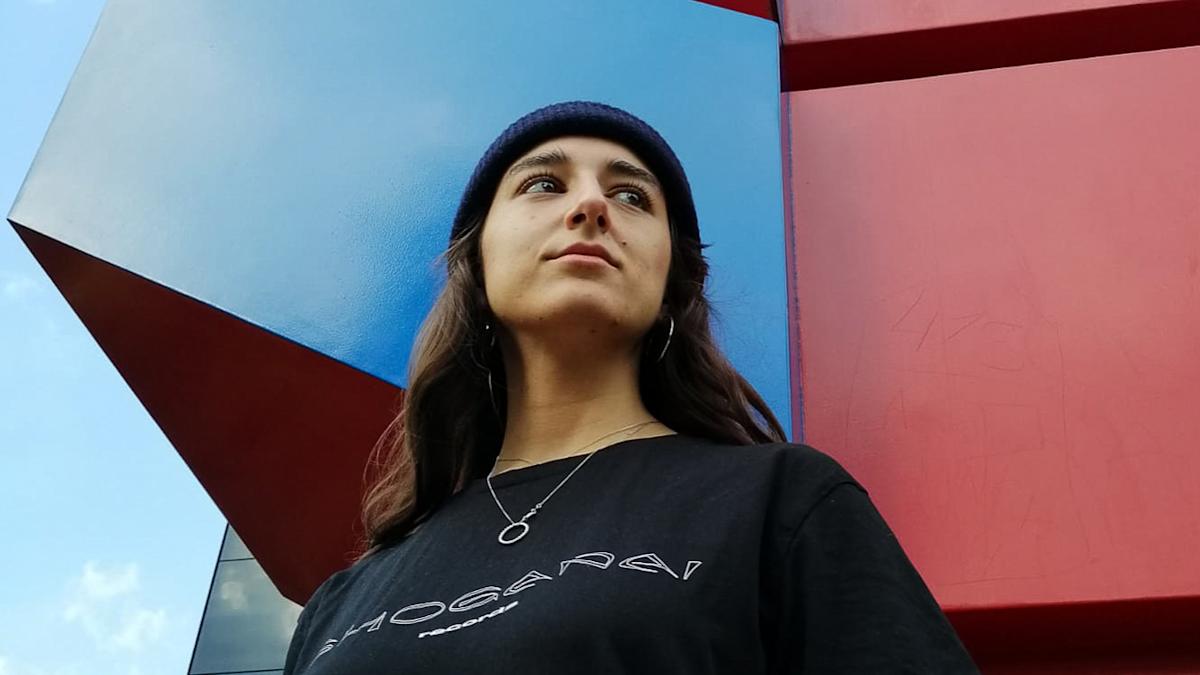
Feministischer Kampftag 2026
Various crews and activities are representing at Niemetzstraße this March.
Loading
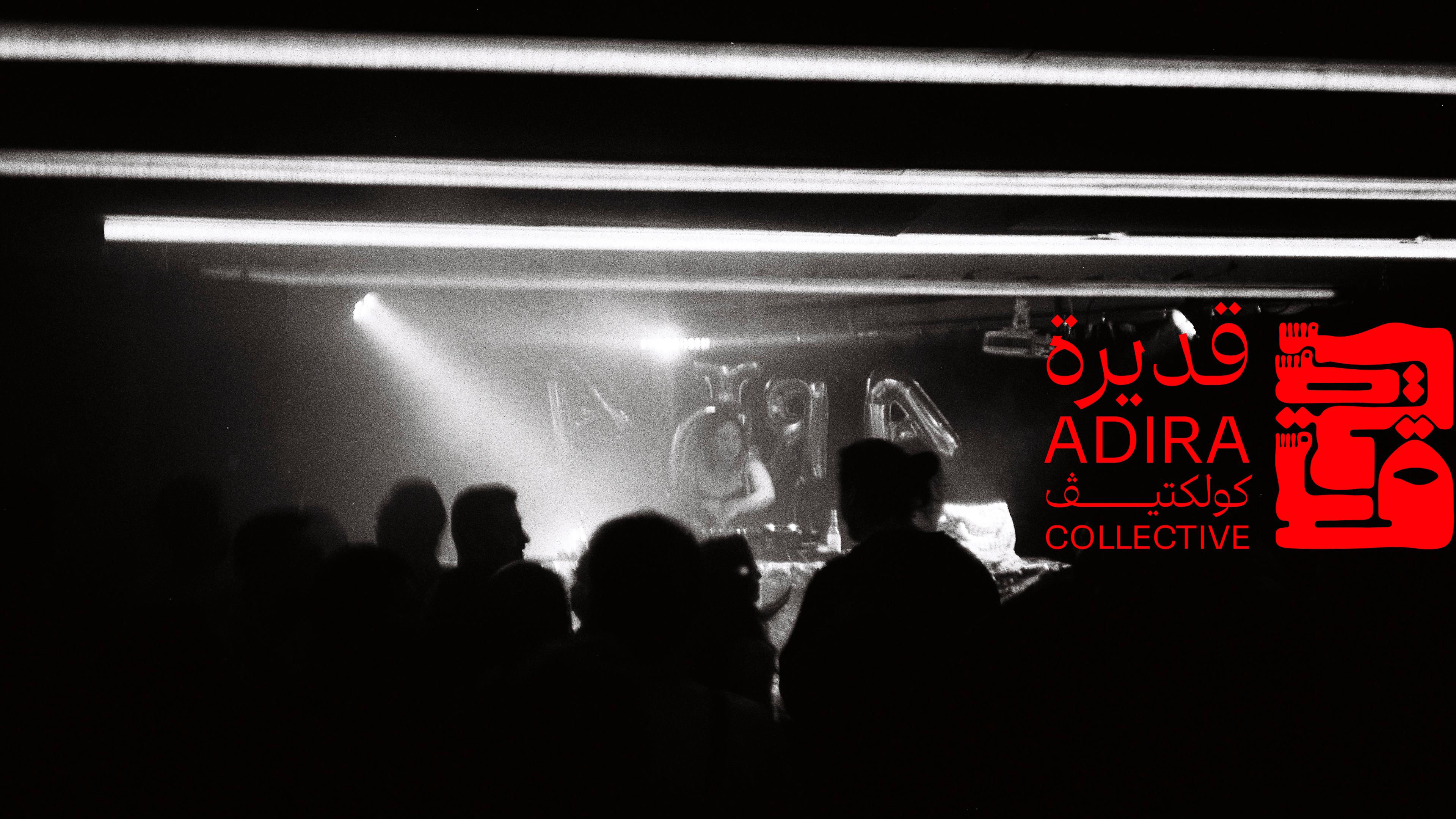
Music as not just a party, but a necessity to solidarity in turbulent times
By Alice Yang
ADIRA is a grass-roots Berlin-based art and music collective, first starting as a pop-party nightclub series and expanding to a community. It’s a space where queer Arabs and allies alike can DJ, perform, dance, and collectively be together to celebrate the colorful array that consists of queer Arabic culture – a space for nurturing a community that uplifts and supports both emerging and established talents.
From 12-14 November, ADIRA presents the second edition of ADIRA Drag Festival at Festsaal Kreuzberg and Barazani featuring a series of workshops, performances, panel talks, and DJ sets by more than 30 artists from Arabic-speaking regions all over Europe. With the theme Queer Arab* Futurism, the weekend is “a love letter to our future selves”, imagining a future “of sovereignty, a world where borders don’t exist, legacy is redefined, astrology takes the place of authority, and pop divas honor the queers and girlies who shaped them.”
In this interview, we speak with founders Zuher (aka xanax_attax) and Hassandra (aka Hassandra), to dive deeper into the role of music as joy, joy as resistance, and what it means to be truly seen in a community. Together, they reflect on ADIRA’s story, its roots, and the essential role diasporic spaces play in nurturing safety, self-expression, and belonging within their communities.
Zuher: We worked together before we started ADIRA. There was ‘a’ Queer Arab Party collective that Hassandra started around 2018 or 2019 with another friend, and I was a resident DJ. We stopped during the pandemic. Afterward, Hassandra and I reconnected by coincidence. They were offering drag makeovers, and my best friend and I are big fans of drag. I gifted her a session with Hassandra.
Drag makeup takes a long time, so we had plenty of time to talk. My best friend, Gizem, runs the party Hoe__mies here in Berlin. Hassandra and I already knew each other from Queer Arab Party, and we just got along really well.
Eventually, we thought, why not try something similar: an event focused only on queer and Arabic pop. That’s how the idea was born. We launched our first event in February 2023.
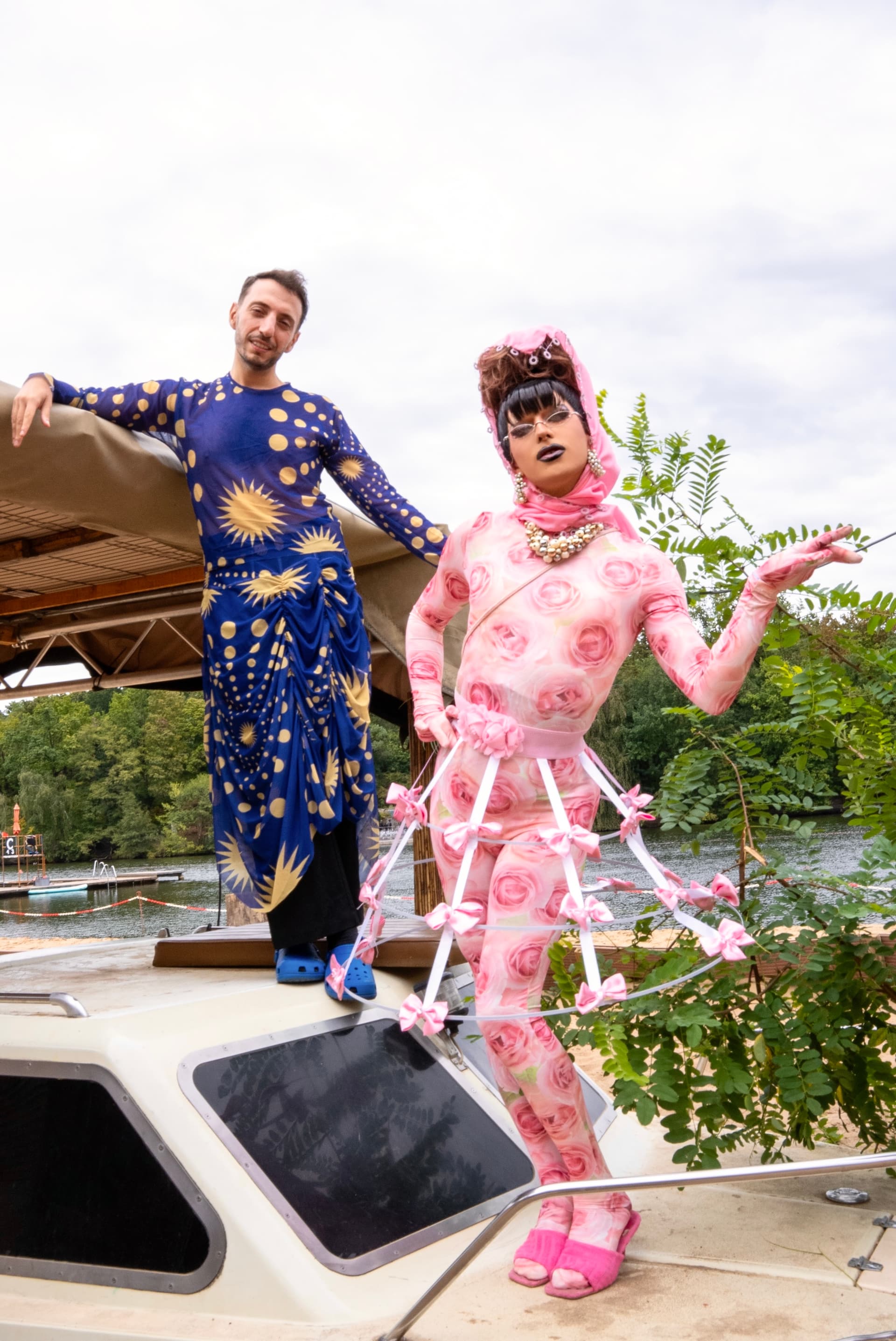
Zuher and Hassandra, 2023
How did you come to focus on Arab pop? Was it a niche you felt was missing, or was it based on your personal interest?
Zuher: Both. What drives me, and I think also Hassandra, is our love for Arabic pop-music we grew up listening to. I was born and raised in Berlin but also spent a long time in Saudi Arabia, so I was exposed to music that people here don’t really know. That’s part of my personal motivation.
One story I often tell is from 2016 in Leipzig. I was in a group of German and Syrian friends. The German friends wanted to go to a 90s party, super excited about the music. But when we got there, it was mostly Germans enjoying it, as they recognized the Western music references. The Syrians, on the other hand, didn’t enjoy it at all because they had a different musical background.
We joked, “Why don’t they play Haifa, Elissa, or Nancy?” And that question stuck with me. I thought, why not? That’s when I started thinking about learning to DJ, to bring the music I grew up with to people who miss it here. It started with wanting to create a sense of inclusivity. It was really painful to see how excluded the Syrians felt. The moment stuck with me. That same group of friends is still the most loyal, showing up to every event. They could ask to be on the guest list but never do, wanting to support the party by buying tickets. It’s beautiful how the event has grown and how much it means to people who feel represented.
We wanted to build community not just through diversity in lineups, but also in sound. It’s so important for everyone on the dance floor to feel like they belong. It's a privilege because so many groups and communities are excluded from this Western-centered narrative. Many people didn’t grow up with Western culture. As the Arab community in Berlin, we’re lucky to be part of such a large population here. If we tried this in a smaller German city, we probably wouldn’t have the same response. Even within the Arab community, we don't fully represent everyone.
What we mostly bring is Lebanese, Syrian, Palestinian, and Egyptian Arab culture. But there are also Moroccan, Gulf, and other regions with their own specific music styles I’m not familiar with. So, we don’t claim to represent everything; we just share what we know and what resonates with the people who attend. At our last party, for example, we had a floor dedicated only to North African music.
Do you feel like the dominant German party scene is aware of the Arabic or non-white communities? You're aware of North African scenes, for instance, even if you're not deeply familiar. Does the same effort exist within the German party scene?
Zuher: I can only speak for myself. I don’t know what they think or how they see things. I don’t know how they view themselves, especially since the scene is heavily techno-driven and centered on white artists. I also don’t know how they view us: queer, Arab, and pop-focused; basically the opposite of what they are.
There’s this recurring pattern: queer people are often laughed at or dismissed at first, but eventually, the very thing they mock becomes what's popular. I'm used to that kind of arrogant dismissal. Personally, I don’t think we’re respected the same way others are.
But I also don’t want ADIRA to become a party that caters to white Germans. I'm happy if some come who genuinely resonate with the music and values — people who are anti-Zionist, pro-Palestinian, and want to engage with Arab culture beyond just political issues.
Arabness isn’t only political. We're more than that. We’re more than music, too. It's about being taken seriously as people with struggles, culture, dignity, history, and individuality. We're not a monolith.
A party space becomes a cultural space. It gives the queer Arab community room to express itself beyond the political narrative.
How do you see parties as a protest?
Zuher: Before ADIRA, I was involved in a lot of political work. Starting ADIRA was my way of creating something joyful and fun. I wanted something less political, but something that will last a long time.
Our first event in February 2023 happened right after the major earthquake in Syria, Kurdistan, and Turkey. That first party became a fundraiser. We had planned it long before, and suddenly we were asking ourselves: should we cancel? The idea that this was going to be non-political didn’t hold up. Even our first party carried a huge emotional and political weight. People queued for hours in the snow just to get in. Other events were happening the same night, but people still came to ADIRA because it was our first. That support continued, and then in October, the 7th happened.
But it turned out to be a deeply meaningful event. It brought people together through music, memory, and emotion without needing words. Music speaks in ways conversation can’t.
We realized again that we aren’t just a party. We’re something more. And we have a responsibility as a community collective to curate this ‘third space’ with intention and care.
Our next party was already scheduled for October 14, just a week after October 7. Again, we asked: “Do we cancel? What’s the right thing to do?” But every time, we’ve seen how important it is to hold these spaces, especially in moments of crisis. We're living through genocide against Palestinians, Lebanese, and Syrians.
During that October 14 event, seeing people dance, laugh, and cry at the same time proved how essential this is.
Music can hold that complexity. It’s not about words but a shared feeling, memory, and expression. And that’s become incredibly important.
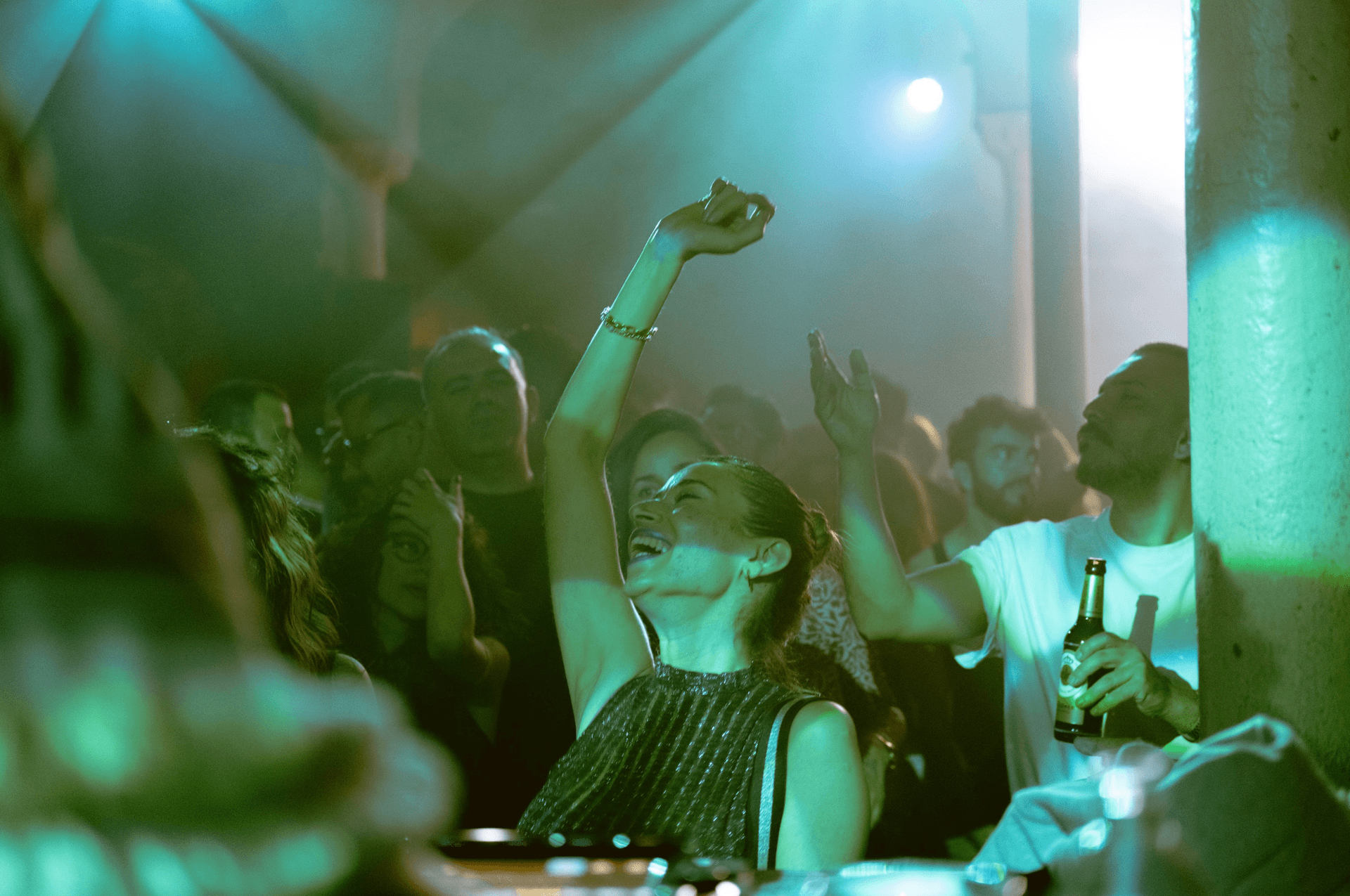
ADIRA Party, October 2023
Even though I’m someone who usually writes and intellectualises everything, there are things I just can't put into words. Having this outlet, doing something expressive without needing words, feels like a huge relief for me.
Especially if you’ve done activist work, you know how long it takes, how draining it is, and how often it doesn't go the way you want. It's exhausting. So, having a space that is still activism, but in a healing way, is really important.
To do something that’s not anti-anything, but instead reframed as pro-Arab community, pro-queer, and pro-solidarity. It’s a different energy: it changes how people feel. It’s about progress, connection, and mutual appreciation. That’s what makes it beautiful: people feel seen and valued.
We're not just working against something. We’re working for something. That shift matters.
Of course, it’s still exhausting to organise. But working for something gives you back energy. It feels more worthwhile. Yes, we’re tired, but seeing happy faces instead of angry, bitter ones, especially from people who deny your existence, makes it all feel that much more meaningful.
Period.
How have you seen this year’s political shift to the right impact the community? Why do you think having a space carved out for Arabic Queers to come together and celebrate is important, especially now?
Zuher: So far, there haven’t been concrete effects, but they will come, unfortunately.
The new right-wing government, as of this year, will have impacts, especially on Arabs. One major concern is deportation: sending people back to countries like Syria. I fear that’s going to become a very real issue soon. We’ll likely start seeing people directly affected by these policies.
Another big concern, especially for those of us working in cultural and political spaces, is how the fight against anti-Semitism is being instrumentalised. People working in anti-Zionist or pro-Palestinian contexts who rely on public funding will be targeted. They’ll be forced to question how they can continue their work without losing financial support. Our new cultural minister has already said that no funding will go to “antisemites,” and, of course, they use that to discredit anyone with a critical stance on Israel or Zionism. That kind of rhetoric is dangerous.
It’s frightening because it’s becoming a reality very quickly. That’s why we need to start thinking strategically: how to support one another, how to unionize, and how to survive as collectives that don’t align with the state’s ideology.
This is really important for everyone because there’s no going back. There’s no return to the “good old times”, when diversity, Black Lives Matter, anti-racism, and queerness were widely embraced. That momentum is gone. We’re seeing a rollback, and now is the time to think about how we can better support each other.
If you mess with one of us, you mess with all of us. That’s the energy we need to build; real support across communities.
For people in Germany, Arab or not, who want to be more inclusive and supportive of different cultures, what would you say is the best way to start?
Zuher: There’s no limit. I love seeing how Arab pop music is trending on SoundCloud and TikTok. So many people are into it, and that’s great; that’s one way to start. But it goes deeper.
We’re not just political subjects, and we’re not just music. We’re both and more. So I’d say: learn, read, organise, support, stay in solidarity. We’re in times of genocide; every form of support is needed right now. Support Arab collectives, especially the intersectional ones that are queer, feminist, or both. We’re doing a lot here in Germany. It’s wild how much we’ve built, especially our collective. We bring so much to the stage. But most of the support comes from within the Arab community. When it comes to the German white mainstream, I don’t feel seen. The dominant culture here, especially in nightlife, feels disconnected. I think it needs a real shift.
We shouldn’t use the same standards for an Asian woman or a white cis man. I see strong support between communities from the Global South. I see it at protests. Of course, there could always be more solidarity, but it’s moving more than the dominant society does, especially on issues like Kurdistan, Congo, Sudan, or Palestine. We call it an Arab space, but it’s really a space for all marginalised people in this society to come together and feel seen. Just like with unionisation, it's part of resisting colonisation.
What events can the community look forward to in the near future?
Zuher: In November, we’ll host the second ADIRA Drag Festival, the first Arabic drag festival in the world. Last year was the first-ever, and this year there will be more than 30 participating artists from Arabic regions all over. It will take place across three days at Festsaal Kreuzberg with more than 700 attendees. The programming features more than just music. We will also host a series of workshops that encourage the continuation of cultivating Queer Arab* radical imagination. Next year, we’ll be touring other festivals and countries as well, and plan to throw a party every two months. We already have the dates.
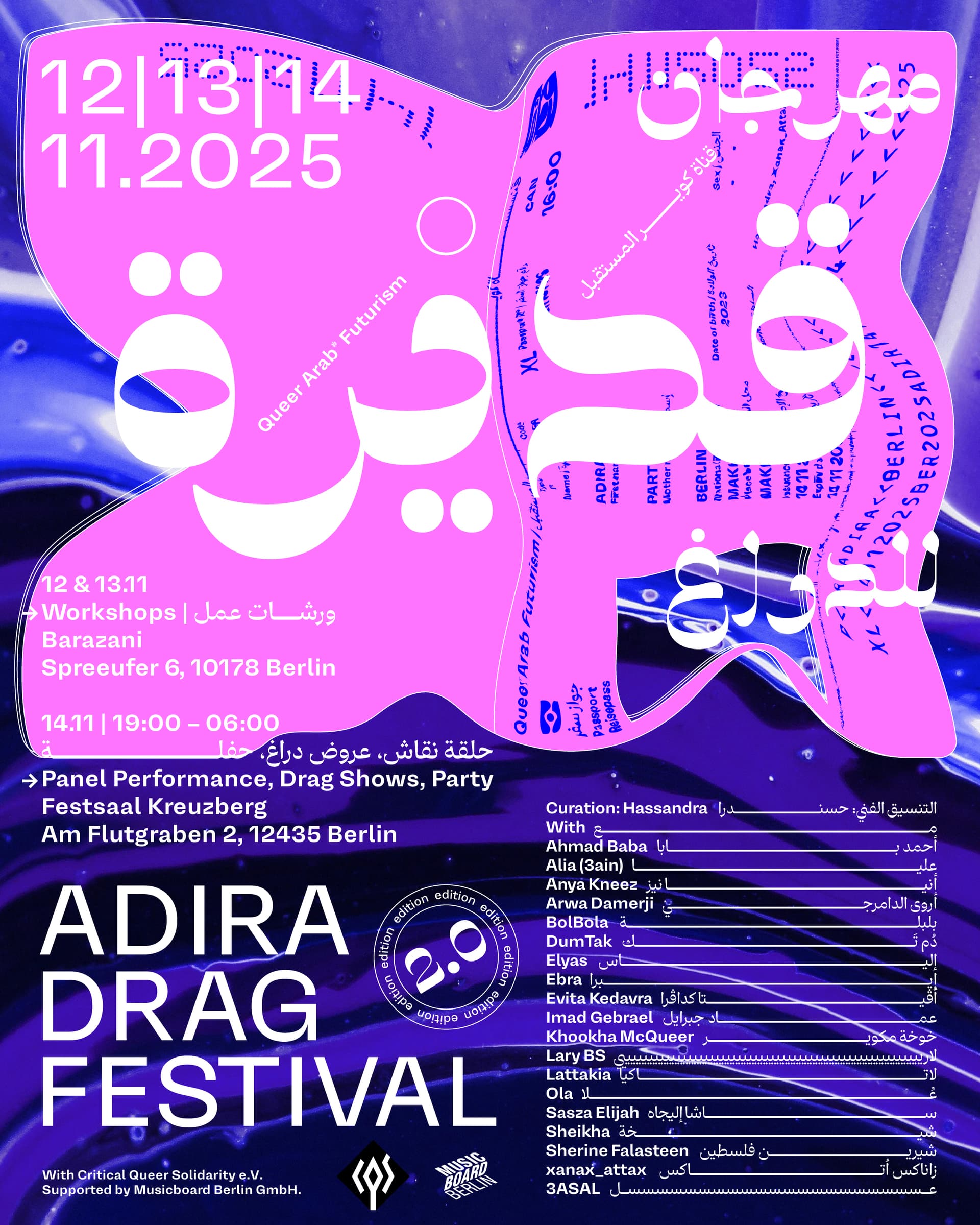
ADIRA Poster* & Festival Line-up, 2025
What’s a dream collaboration?
Zuher: When Mia Khalifa comes to ADIRA, that will be a full-circle moment. I wish!
What does a typical ADIRA party look like?
Zuher: There’s always a twist. We have two dance floors: the main one and a smaller one we dedicate to specific themes. Sometimes it’s North African music, but we are also planning fusions like Baile Funk with Arabic. We get creative. Then there’s the twist, maybe a dance competition, fashion contest, drag performance, or comedy show. Not everything works perfectly, but we love to experiment.
Most techno parties just have a DJ and a dance floor, which is fun, but sometimes it lacks togetherness. That might be why some people feel the need to take drugs to feel that connection. But at ADIRA, the vibe is already good. You don’t need that to feel like you belong. We’re not a druggy party. ADIRA is sweet and modest, very cutesy.
People say, “I’ve never been to a party this fun. The music is great. The crowd is kind. I felt like I connected.” Maybe you don’t need to fall into a G-hole after all.
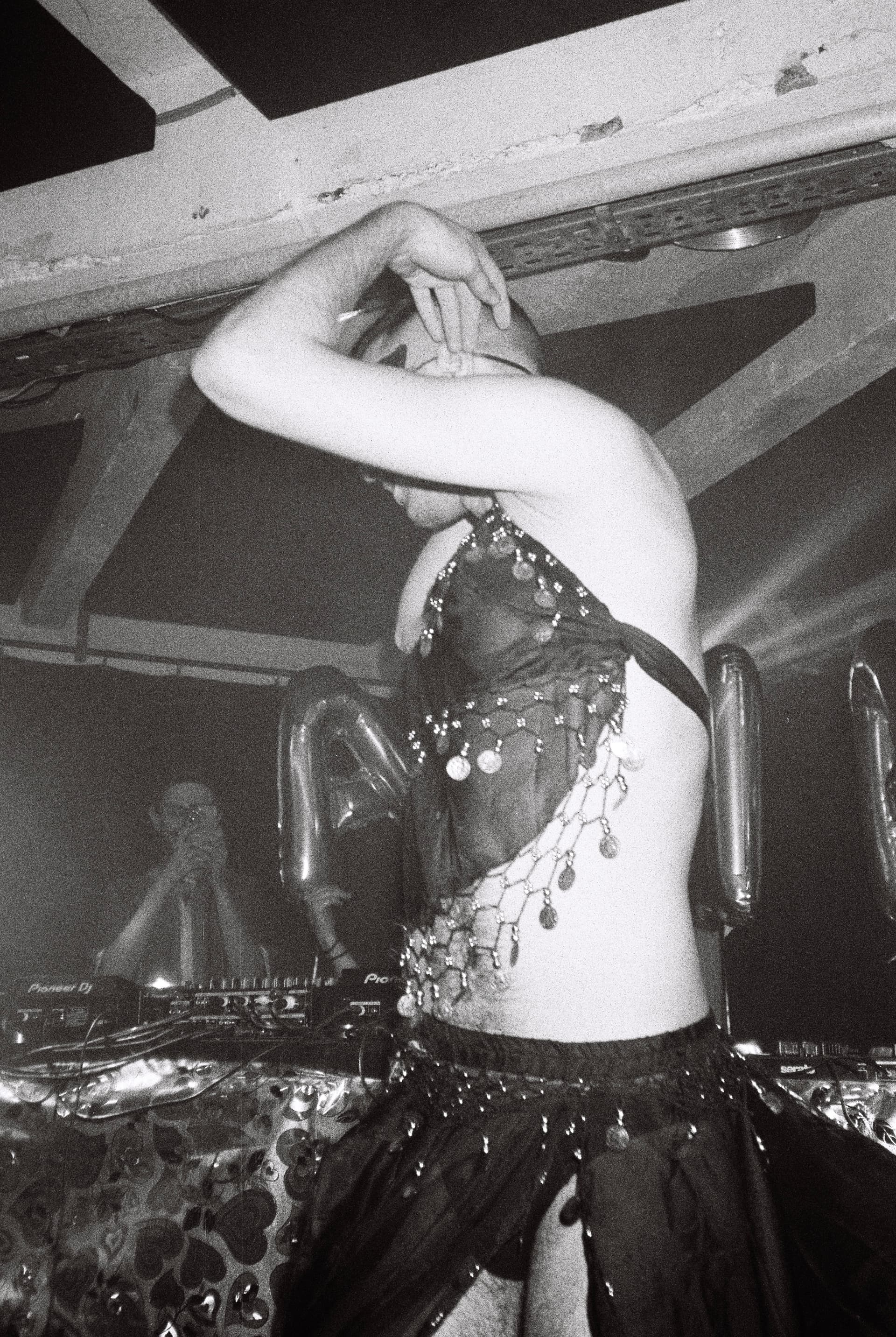
ADIRA Party, October 2023
Any final message for the community?
Zuher:
When there’s no solution, there’s prostitution. But seriously—there’s always hope. Period! (.) <3
Can you start by telling me a bit about yourself and your practice as an artist?
Hassandra: I'm Hassandra. I’m 31, originally from Beirut, Lebanon. I began my journey as an actor, having studied theatre and stage acting at the Lebanese University. But after moving to Berlin, I transitioned into drag which led me to DJing. Not long after that, I created ADIRA, something that really brings together my personal life and artistic practice.
Through ADIRA, we launched the ADIRA Drag Festival, first in June last year and again this November. It’s the first festival that centers Arabic drag in this way, which felt like such an important step, especially with everything going on last year. It gave people a spark of hope, and for many, it was the first time they saw performances tailored not to a white gaze, but to our own community.
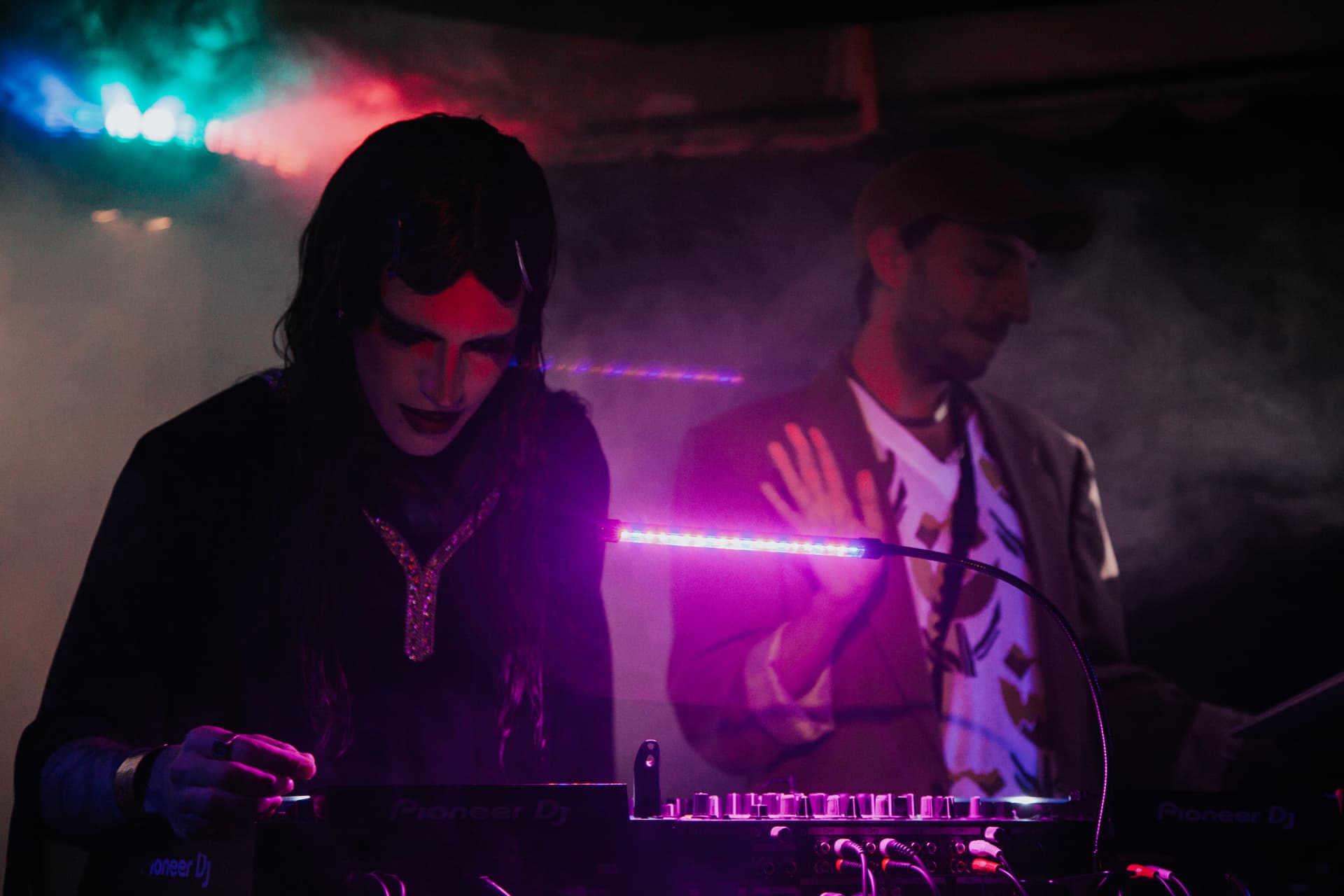
Hassandra & Zuher at ADIRA, October 2023.
Was this blending of drag, DJing, and community-based performance something intentional for you from the start?
Hassandra: It was a natural progression, really. I didn’t want to conform to the strict structure of traditional theater; it felt limiting. Drag gave me the freedom I was craving. But drag, as we know, often lacks institutional support. You do so much for so little in return. That’s where nightlife came in. It felt like a space where you could be unfiltered and free, yet still artistic.
Berlin’s nightlife, though, can sometimes be isolating. It’s very focused on techno, escapism, and intoxication. ADIRA was meant to be the opposite: communal, emotional, sensory. It became this space that feels more like your auntie’s living room than a club. We’ve even used scents in our parties that reminded people of sacred spaces or childhood homes. It’s a party, yes, but also a place of cultural and emotional reconnection.
Can you talk more about the political dimension of your drag?
Hassandra: Sometimes, the most political thing an Arab can do today is simply be on stage in drag and say: “I exist. I deserve joy.”
That in itself is radical. Drag is incredibly malleable, allowing for commentary on society, but also for healing.
I’ve done performances around fetishisation and dating as an Arab, for instance. These are political topics, but I often approach them with humor. Humor softens the delivery but still communicates the urgency. It creates solidarity in a way that doesn’t exhaust the audience.
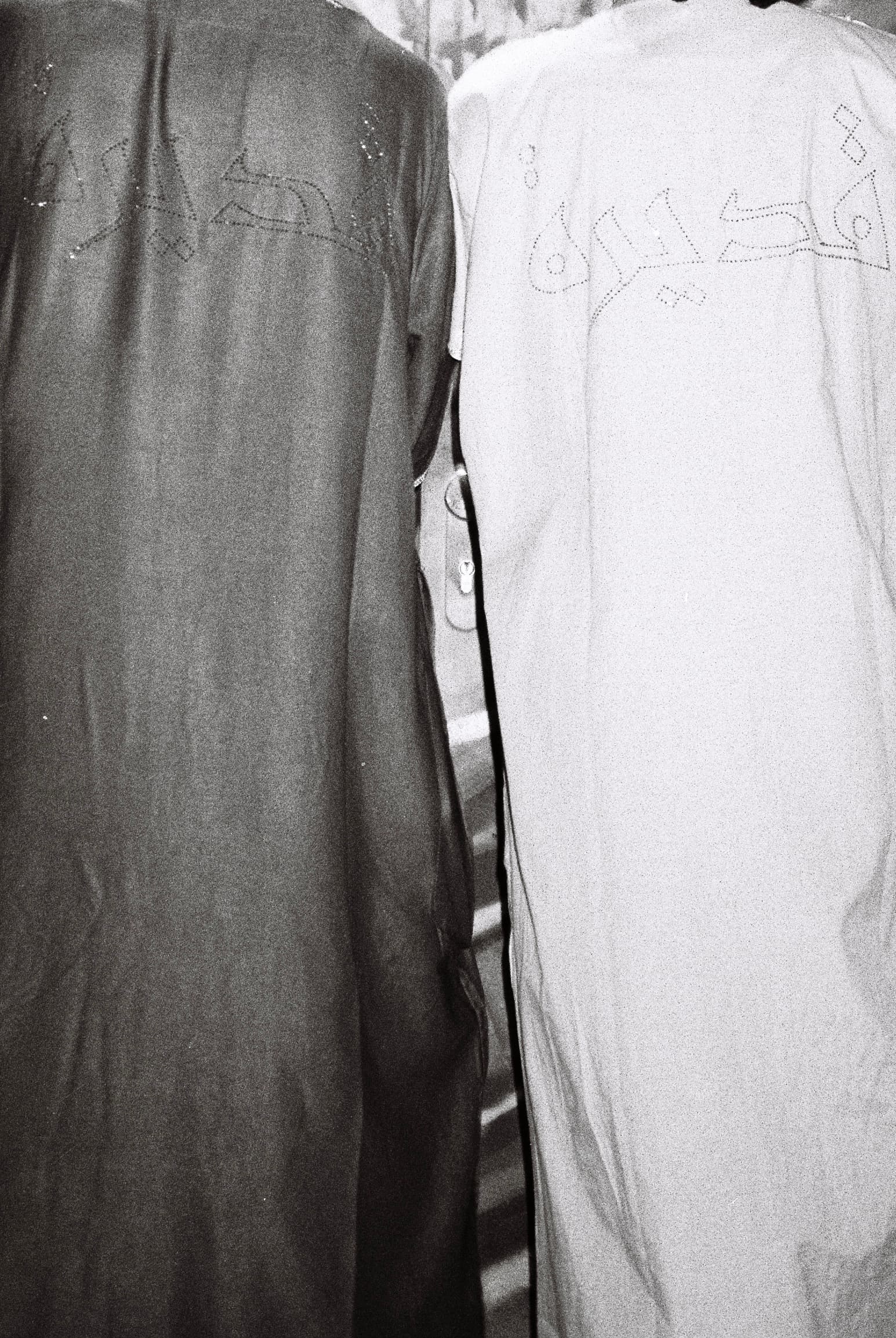
ADIRA: Eid Edition feat hand-rhinestoned Abbayas by Rami Shalati. Text: ADIRA in Arabic, July 2023
What’s it like performing for a primarily queer Arab audience compared to other, less inclusive spaces?
Hassandra: Empowering. I used to trim parts of myself, editing myself to cater to more “international” drag stages. I walked on eggshells, constantly afraid of being tokenised or misunderstood. At ADIRA, I don’t have to explain anything. The crowd gets it. That gives me and other performers a deeper sense of freedom and authenticity.
We’ve had performers from all over, and sometimes they begin by performing for a Western gaze. But once they realise the crowd is full of Arabs, something shifts. I always tell them: you don’t need to perform in English. Choose the song you connect with. When that happens, it’s magical.
They stop translating themselves for others and start expressing themselves fully.
Why do you think this type of space and art is so important for queer diaspora communities?
Hassandra: It’s a form of comfort and healing. Especially last year, we just needed to be in the same room, to look at each other and say, “I know what you’re feeling.” No need for explanations. We’re all in this in-between space: we’re not fully at home in Berlin, but we’re also not back where we’re from. We float. And through music, scent, and visuals, we can revisit memories and reclaim them, even the painful ones.
The next ADIRA festival’s theme is futurism. What can you tell us about that?
Hassandra: Each performer will interpret the theme in their own way. But for us as a collective, futurism doesn’t exist without the past. We’re working on archiving and preserving, something that was historically denied to many in the Global South because of colonial structures.
We’re launching a digital archive! A website that houses articles, media, and documentation. It’s a tool for the community, and who knows who might stumble upon it years from now? Maybe a Gen Z’er in 2030 will discover what happened at Adira and feel something from it.
You’re also a DJ. How does nostalgia play into your music?
Hassandra: I grew up listening to a lot of Arabic pop that’s now considered nostalgic. But that nostalgia exists partly because production in the region declined due to political and economic instability. So we’re often working with a fixed archive of music that stops evolving at a certain point.
I wonder what’s next for ADIRA musically. The songs millennials connect with might not resonate forever, and we follow the community’s needs. ADIRA emerged as a response to something missing, and it continues to shift with the moment.
There’s a lot of nostalgia in the air these days. Do you think that’s a symptom of the current world?
Hassandra: Absolutely. We’re living in chaos politically, socially, and environmentally. People are disconnected. So we romanticise the past or the idea of simpler times. But maybe it wasn’t simpler — maybe it was just different. Nostalgia can be powerful and healing, but also cringy or overused. It’s important to stay critical about it. Maybe that’s a future theme for ADIRA, too: romanticisation vs. nostalgia.
Any final message for the community?
Hassandra: Just that I’m grateful we can build spaces like this. Not only to perform, but to exist. To imagine. To laugh. And to ask, together: where do we want to go?
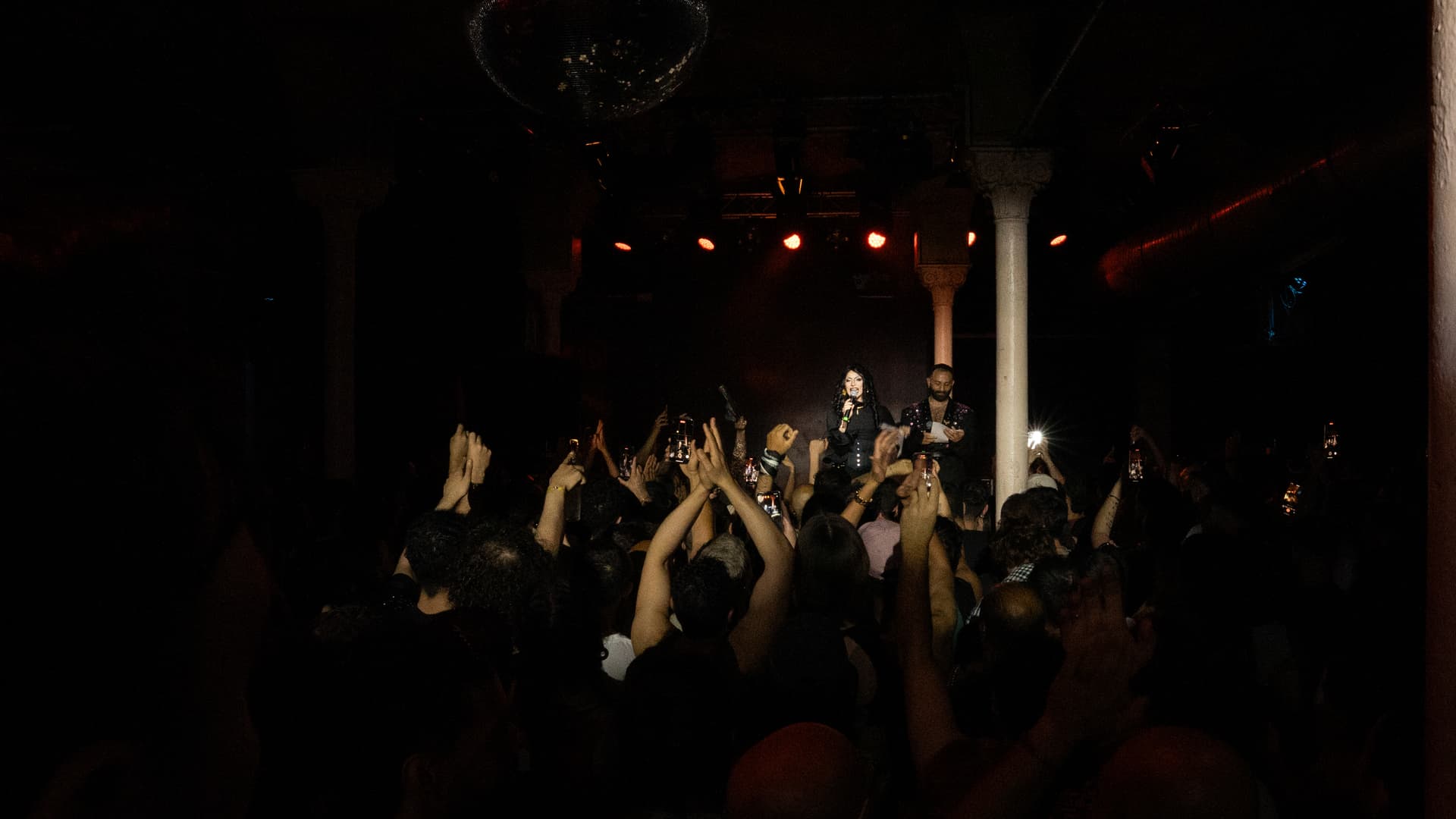
ADIRA Party, October 2023
While Berlin’s club scene is open to and inclusive of all identities, it is not only important but necessary to intentionally create carved-out spaces for minority groups where people with a shared identity can express themselves freely and safely. Parties without this intention, even if inclusive, still hold unspoken hierarchical tensions rooted in European colonial history, making intentionally reserved spaces like ADIRA vital for building feelings of familiarity and security for Arab Queers.
In everyday life, the unspoken tensions between groups in public space complicate how safety and belonging are felt for each individual, impacting the extent to which people feel free to explore, accept, and take pride in their authentic identities. Although dominant spaces in Berlin may be inclusive of all identities, they do not allow the same extent of freedom of expression as a space where most of the group has a shared background or identity. These are spaces carved out with the intention for one group to navigate their political and social realities. In ADIRA’s case, the party becomes a space to navigate queerness within Arabic culture while also reclaiming how Arabic identity is perceived in the West. This shared cultural grounding allows individuals to exist freely—without the burden of feeling like the “other.”
As well, it is also important that ADIRA represents the queer Arab community in nightlife, rather than daytime spaces. Nightlife holds a unique value for embodying identity, especially for minority groups. They allow people to not only to feel safe in, but also to explore and celebrate an identity that feels truly authentic to them.
As both Zuher and Hassandra emphasised, music conveys emotions without needing words, having the capacity to hold the complexity of whatever is felt in today’s political climate without being emotionally exhausting in the same way that traditional activism can be. At the party, the community can just dance, be, and feel for each other — a sacred solidarity that redefines culture, one beat at a time.
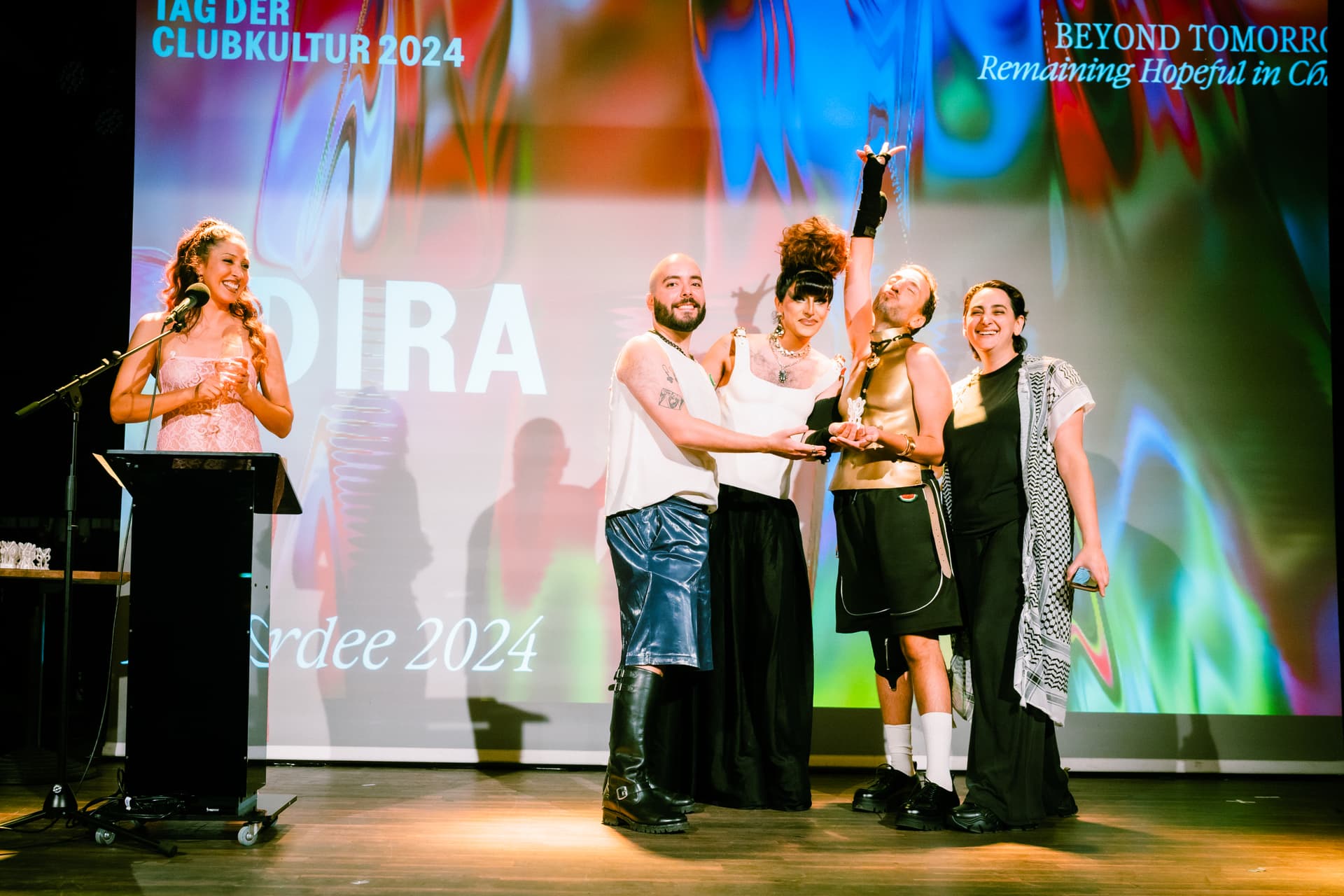
ADIRA at Tag der Clubkultur 2024 Awards
Dance as protest with ADIRA Party at ADIRA Drag Festival 2.0: Queer Arab* Futurism from 12-14 November. Grab your tickets here! More info here.
Photos courtesy of Derdie Tansu, Cora Hamilton, and Mayar Attia.

Various crews and activities are representing at Niemetzstraße this March.
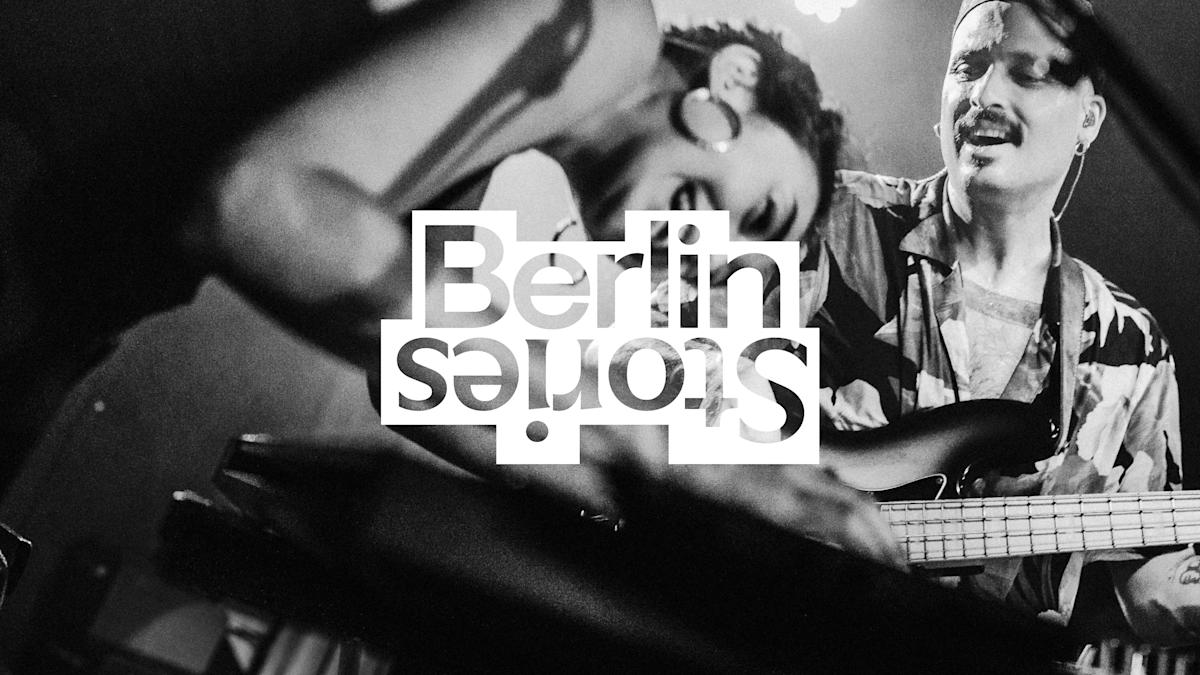
This week: listening sessions, Palinale, lunar new year

Catching up before Heavy Feelings & Refuge Worldwide takeover at Open Ground